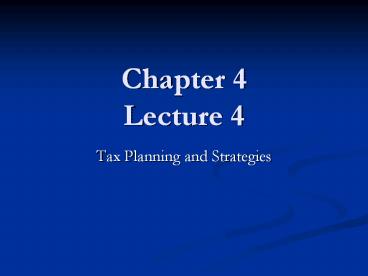Chapter 4 Lecture 4
Title:
Chapter 4 Lecture 4
Description:
Chapter 4 Lecture 4 Tax Planning and Strategies –
Number of Views:107
Avg rating:3.0/5.0
Title: Chapter 4 Lecture 4
1
Chapter 4Lecture 4
- Tax Planning and Strategies
2
Individual Income Tax Formula
- Total Income (everything received)
- - Exclusions/Tax-exempt Income_______________
- Gross income (GI)
- - Adjustments______________________________
- Adjusted Gross Income (AGI)
- - Greater of Standard or Itemized deductions
- - Personal and dependency Exemptions
_________________________________ - Taxable income (TI)
- Tax rates 10-35______________________
- Tax liability
- - Tax credits
- - Tax prepayments___________________________
- Tax due or refund
3
Tax Credits
- Tax credits are subtracted directly from taxes
due on a dollar-for-dollar basis.
4
Deduction vs. Tax Credit
- A deduction reduces the amount of income that is
taxed. - Deductions are subtracted from AGI before you
calculate income taxes due. - A credit reduces the tax.
- The amount of the credit is subtracted from
income taxes due.
5
Types of Tax Credits
- Child Credit.
- Hope Scholarship Tax Credit.
- Lifetime Learning Credit.
- Child and dependent care credit.
- Earned income credit.
- Adoption credit.
6
Paying Your Income Taxes
- W-4 Form -- provides your employer information
about your marital status and number of
exemptions you wish to claim. - Withholding -- is the amount of tax that is paid
each time you receive a paycheck. This is why
there is a difference between your gross pay and
your take-home pay. - Estimated tax payments.
7
Tax Formula Example
Bob Stone needs help with his tax return. In
2005, he received a 38,000 salary, 200 in bank
interest, and 1,500 in lottery winnings. He
paid 1,500 in medical expenses, 3,000 to a
Traditional IRA, 7,000 in mortgage interest,
3,000 in federal income taxes withheld, 1,500
in state income taxes, and 500 in charitable
contributions. He also a has a 200 federal
income tax credit. He files as single with no
qualifying dependents. What is Bobs taxable
income, gross tax and tax due for 2005?
8
SOLUTION
9
Late and Amended Returns
- Filing late.
- Must request an extension of time (Form 4868)
from the IRS. - 4-month extension is automatic.
- You must pay the estimated tax due by April 15th
(or will be charged interest and penalties). - Amending your return.
- File Form 1040X.
- Limitation - 3 years.
- Amend state and local returns.
10
Reasons for Being Audited
- Random.
- Previous errors.
- High income level.
- Filing a Schedule C.
- Audits allow the IRS to conduct spot checks of
returns to ensure compliance to the tax laws and
regulations.
11
Preparing for an Audit
- Reexamine the areas in question.
- Gather all supporting data.
- Anticipate questions.
- Hire a tax accountant or attorney (if necessary).
- The best way to win an audit is to keep excellent
records and take supported tax positions.
12
Appealing an Audit Outcome
- Appeal with the auditor.
- Appeal with the auditors manager.
- File a formal appeal.
- Go to court.
13
Tax Strategies to Lower Taxes
- Maximize deductions.
- Use tax-deferred retirement programs.
- Use your home as a tax shelter.
- Look to capital gains and dividend income.
- Shift income to family members in lower tax
brackets. - Receive tax-exempt income.
- Defer taxes to the future.































